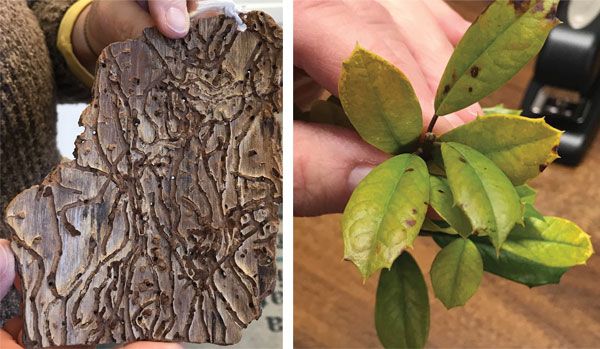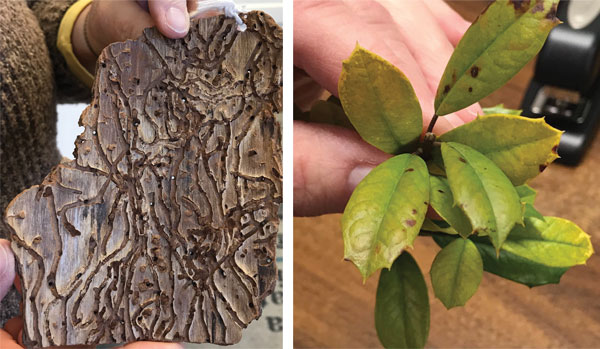Master Gardeners 2.0 |What Does Your Garden Grow?


Master Gardener—the title sounds exclusive, but speaking with one is actually like talking to a good friend. Master Gardeners are educated to help you. “We solve puzzles,” says Master Gardener Ellen Urbanski. These horticulturists are trained to help you find answers to the problems you have in your backyard and garden. By calling into the Help Desk, which local Master Gardeners man at the Virginia Cooperative Extension, you can get advice on everything from plant disease to planning a garden. For people who just want to learn more about horticulture, they offer monthly lectures on topics such as overcoming landscaping challenges to practical knowledge of perennials.
Master Gardener Programs can be found all over the United States; Roanoke has had an active group since 1987. Roanoke’s program maintains a healthy 88 active volunteers who donate over 7,000 hours every year. Sometimes called Extension Master Gardener Programs in other areas of the country, they are all locally run courses that train interested people in gardening skills. Once trained, Master Gardeners then share their knowledge with the community.
Although the training is extensive, eight weeks in the classroom followed by a 50 hour internship the first year, the material is not difficult. Classes run one day each week for two hours and each course covers a different topic. Subjects include a tremendous breadth of interesting matters—botany, propagation, pruning, plant diseases and pest management are some of the topics they explore. Each person who enrolls is given a large binder that serves as their study material and reference guide. There is an open book test at the conclusion of the class work.
These trained volunteers then give back to the community teaching others the art of gardening and the science behind it. They volunteer their time by working at local extension agent help desks and giving talks to educate school children and community groups on gardening knowledge and skills. Master Gardeners use various methods to research an issue: they have their big book of reference material that each one is given at the start of their class; research gained through the required eight hours of continuing education each year and they can turn to the experts at Virginia Tech and Virginia State University to assist with an unusual or new conundrum. Although many garden dilemmas can be simple for these experts, some can be difficult to diagnosis, so they are grateful for these resources.
Master Gardeners volunteer and assist with manning the Master Gardener Help Desk, working with local Horticultural Therapy programs, giving demonstrations and workshops at our Community Gardens. They educate visitors at the Community Arboretum at Western Virginia Community College, mentor our youth, specifically in 4-H programs and speak to local civic groups on many horticultural topics.
“I really do enjoy working the help desk,” says Ellen Urbanski. “It is an incredible source of information. It is very satisfying helping people find an answer to their question and solve their problem.” People can call into the Help Desk with a question, or they can stop by and chat with the Master Gardener on duty. This is an excellent way to get information if you have a plant with a disease or a twig from a tree that has an unusual fungus. Bring a sample of your problem and show the expert.
To stay up to date with the latest scientific information, Master Gardeners must complete their own continuing education requirements each year. These can be done in a variety of formats. Attending Master Gardener meetings which host a program every month is most popular. These talks are open to the public and are a great way to gain more general garden knowledge.
The next time you encounter a pest or problem in your yard, a Master Gardener is there to help you. The Master Gardener Help Desk at Virginia Cooperative Extension phone number is 540-776-7178. For those who want to stop by, Virginia Cooperative Extension is located at the Brambleton Center at Cave Spring Corners: 3738 Brambleton Avenue, SW, Roanoke. Check out their website at Roanoke.ext.vt.edu. ✦
For information on classes or the Virginia Cooperative Extension Program, email Kathleen Reed, Agriculture & Natural Resources Extension Agent at reedka@vt.edu or call their main number at 540-772-7524. Virginia Cooperative Extension Roanoke County/Roanoke and Salem Office is open Monday–Friday from 8:00am –5:00pm.
botany, classroom, garden, Help Desk, horticulture, internship, Master Gardener Programs, pest management, plant diseases, propagation, pruning, reference material, research, scientific information






